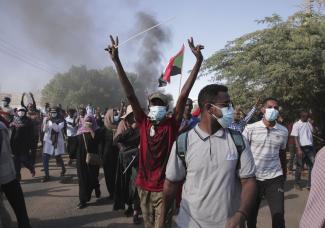Sudan
Sudan’s uncertain journey towards democracy

In late October, General Abdel Fattah alBurhan tried to seize control of Sudan. He dissolved the government, imposed a state of emergency and had several ministers arrested, including the prime minister. That looked like the end of the power-sharing agreement according to which the military and civilian policymakers were supposed to cooperate on a long-term transition to free elections.
Burhan apparently wanted to return to the past. The military dictator Omar alBashir ran the country for 31 years until the spring of 2019. Bashir’s rule ended because of a popular uprising. In view of mass protests, military leaders toppled him and, after considerable manoeuvring, struck the deal to establish a hybrid government with civilians in the summer of 2019.
When news of the new coup spread in October, thousands of people took to the streets in the capital Khartoum. Once more, the military was unable to suppress the prodemocracy movement. Even violent repression did not intimidate the opposition. After more than 40 people were killed, Hamdok was set free in late November, and Burhan signed a new power-sharing agreement with him.
Several of Hamdok’s former ministers, however, refused to rejoin the cabinet. Most likely, some of them would not have been allowed to stay on. Critics point out, this agreement gives the military a stronger role than the previous one did. Ministers must now be technocrats, not politicians. In contrast to the initial deal, moreover, a general is still overseeing the hybrid government. For these reasons, many civil-society activists say they do not appreciate Hamdok’s decision. The prime minister can no longer claim to represent those who want democracy.
Uncertain road to democracy
It is uncertain how Sudan’s journey towards that goal will end. Attempts to establish elected governments proved shortlived in the past. That was so after Sudan gained independence from Britain in 1956 and again in 1964 and 1986. Every time the military took control. From 1989 onwards, Bashir’s rule proved to be particularly brutal. His reign of terror included:
- a bloody civil war against South Sudan’s independence movement,
- genocidal atrocities in the Darfur region and
- support for Osama Bin Laden’s extremist al-Qaeda Islamism.
The International Criminal Court’s prosecutor indicted Bashir in 2008, accusing him of rape, murder and extermination. The ICC even issued an arrest warrant. He was the first – and so far remains the only – serving head of state or government with that kind of infamous international exposure.
The cruel autocrat eventually lost South Sudan, which became a sovereign state in 2011. Important oil resources are there. Bashir was never popular in Sudan, but he led the country during a long oil boom. In spite of western sanctions, oil revenues helped him to create a powerful network involving the armed forces and, to some extent, accommodate urban middle classes.
Toppling Bashir
By 2018, the economy was in tatters. Fuel, food and even bank notes were in short supply. Sparked by the soaring bread price, a peaceful opposition movement arose, with young people, women and young professionals in particular expressing their frustration.
The military top brass saw that Bashir’s days were numbered and deposed him in a bloodless coup in April 2019. After some machinations, General Burhan was sworn in as the new interim president. He promised to root out the military government, prosecute crimes done during its rule and hand over power to civilians.
Bashir was sent to the notorious Kobar prison and several of his leading supporters were arrested. However, all members of the top military leadership had been involved in the regime in some way, and many of them remained in positions of power. Probably the most prominent one was Mohamed Hamdan Dagalo, who is known as “Hemeti” and leads the brutal paramilitary Rapid Support Forces (RSF). In spite of his formally junior role in the junta, many people believed that he was pulling the strings.
The protests, however, did not subside. In early June 2019, security forces killed more than 100 peaceful demonstrators, including 19 children. Shooting, looting and raping indiscriminately, Hemeti’s RSF proved especially reckless.
Despite the massacre, the demonstrations did not stop. A month after the bloodshed, the generals struck an agreement with the newly-formed Forces of Freedom and Change, a coalition of civil-society activists. A joint “constitutional declaration” was supposed to pave the way to civilian rule. It stated that power-sharing would continue for 39 months. For the first 21 months, a general would head the “sovereign council” composed of five representatives of the military, five representatives of the FFC and one civilian jointly chosen by both sides. Then a civilian leader would take over for another 18 months. Elections were promised for November 2022.
As chairman of the sovereign council, Burhan became Sudan’s de-facto president. Hamdok, an economist, who had worked for multilateral institutions such as the ILO and the African Development Bank, was appointed prime minister.
Life remained difficult in Sudan as economic hardships kept mounting. However, people now enjoyed civic freedoms. For example, women’s dress code was liberalised.
Bashir was taken to court in Sudan and was found guilty of corruption and money laundering in 2019. However, his opponents were appalled because he was not sentenced for his acts of violence. He still faces charges relating to the coup of 1989. The former dictator has not been handed over to the ICC, and observers think the main reason is that the top tier of the military fear that he might deliver evidence of their crimes to the ICC.
Families who lost members in the Khartoum Massacre, moreover, did not get justice. It is true that a few members of the RSF were sentenced to death, but their top leader Hemeti still enjoys impunity. He is probably the country’s most powerful warlord.
The most common grievance
Economic hardship, however, is the most common grievance today. The Hamdok government undertook tough economic reforms, including the slashing of subsidies. Sudan thus qualified for debt relief from the International Monetary Fund, but inflation is very high and people are desperate. This summer, protest rallies expressed discontent over Hamdok’s economic policies.
In this context, the military tried to stage the October coup. It is impossible to tell what the role of Hemeti was – and what it is today. It is obvious, however, that Hamdok’s credibility has suffered a serious blow. As long as the economy does not improve, things will remain volatile. That thousands of people kept risking their lives by openly opposing the October coup shows that they are fed up with the military leadership.
Roli Mahajan is an Indian journalist who obtained a master’s degree from Uppsala University. Her course in development studies focused on Africa.
roli.mahajan@gmail.com









